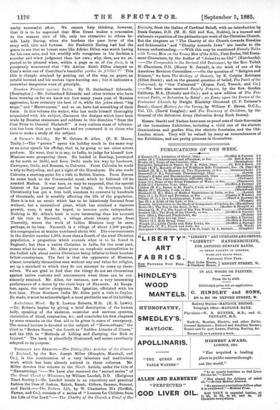A Parson's Holiday. By W. Osborn B. Allen. (F. B.
Mason, Tenby.)—The "parson" spent his holiday much in the same way as an actor spends his off-day, that is, by going to see other actors perform. He went, that is to say, to India, to judge for himself how Missions were prospering there. He landed in Bombay, journeyed as far north as Delhi, and from Delhi made his way by Lucknow, Cawnpore, Oude, and Benares, to Calcutta. From Calcutta he made a trip to Darjeeling, and got a sight of the Himalayas. He also made Calcutta a starting-point for a visit to British Burma. From Burma he came back to the Coromandel coast, which he followed till he reached Madras. It was here, as may be supposed, that the special interest of his journey reached its height. In Southern India Christianity has got a firm hold, numbers its converts by hundreds of thousands, and is sensibly affecting the life of the population. Here it is not an exotic which has to be laboriously fostered from without, but a naturalized plant, which has attained a vigorous growth, soon, it may be hoped, to become quite independent. Nothing in Mr. Allen's book is more interesting than his account of his visit to Nazareth, a village about twenty miles from Tinevelly, where the work of Indian Missions may be seen, perhaps, at its best. Nazareth is a village of about 1,200 people ; the congregation at matins numbered about 800. The communicants in the district number 1,264, more than a fourth of the total Christian population, a proportion which exceeds what is to be found in England ; but then a native Christian in India, for the most part, means what he says. Mr. Allen gives an emphatic contradiction to the foolish talk about native Christians being inferior to their heathen fellow-countrymen. The fact is that the opponents of Missions, almost invariably themselves men without any real value for religion, set up a standard to which they do not attempt to come up them- selves. We are glad to find that the clergy do not set themselves against native customs and amusements when these can be con- sistently retained. Mr. Allen, for instance, saw a very interesting performance of a dance by the choir-boys of Nazareth. At Banga- lore, again, the native clergyman, Mr. Ignatius, officiated with his feet bare. From Southern India Mr. Allen paid a visit to Ceylon. He made, it must be acknowledged, a most profitable use of his holiday.


































 Previous page
Previous page